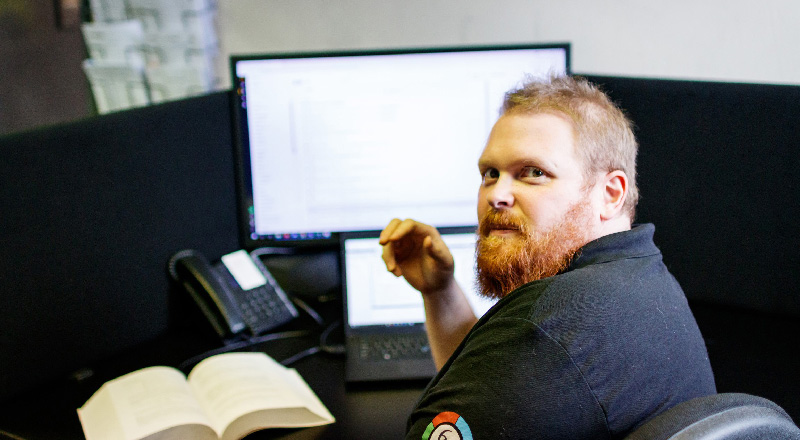“24-hour turnaround” for Mersen UK Teesside high precision products facilitated by Teesside University digitised manufacturing KTP
Mersen UK Teesside, a world-leading manufacturing facility specialising in machined graphite products, anti-corrosion and hot glass handling equipment (CERBERITE®), is now offering a 24-hour turnaround time for low volume, high precision engineering products following the introduction of a digitised manufacturing process developed in a Knowledge Transfer Partnership (KTP) with Teesside University.

Mersen is a global expert in electrical specialties and advanced materials for high-tech industries. With more than 50 industrial sites and 16 R&D centres in 35 countries, the company develops customised solutions and delivers key products to its clients to meet the new technological challenges shaping tomorrow’s world. For Mersen UK Teesside, the KTP fed directly into the company’s overall aim to increase revenue from low volume, high value sales, maximising manufacturing operations profitability and a growing market for highly variable precision graphite parts in short lead times.
A KTP is an Innovate UK-funded programme that helps businesses to improve their competitiveness and productivity through the better use of knowledge, technology and skills that reside within universities. Mersen UK Teesside sought the University’s expertise through a two-year project, overseen by Dr David Hughes, a Senior Lecturer and Enterprise Fellow (Materials Engineering) in the institution’s School of Computing, Engineering & Digital Technologies.
“Due to the nature of products that Mersen manufacture, the part volume is generally low but high value, with small batch (less than 10) and one-off production of specialist parts (known as ‘Strangers’) generating a majority of their current sales revenue,” Dr Hughes said. “Mersen’s objective is to expand its high precision engineering capabilities to meet growing demands from specialist customers it cannot currently serve. Such clients have regular low volume, high value requirements, stringent focus on accuracy, tolerance, traceability and short lead times that were not previously achievable within Mersen’s (or most of their competitors) operations. To react quickly to these unique part requirements Mersen recognised the need for more intelligent manufacturing systems and processes to ensure sufficient flexibility, automation and integration of the Strangers pipeline.”
In response, the KTP project introduced an Electrical Discharge Machining (EDM) webstore offering customers a one-day turnaround time, a significant improvement compared to previous lead times. Activities from the KTP are aiming to increase current market share over the coming years, whilst enhanced data collection and analysis offer significant opportunities for optimisation and a cultural shift to welcome digitisation. This included the addition of Robotic Process Automation (RPA). The project, led by Knowledge Transfer Partnership associate Daniel Pybus – who has subsequently enrolled on a PhD at the University – has addressed several key opportunities, Dr Hughes explained.
“Developing knowledge and tools to collect, measure and monitor production data has been an important development which has allowed Mersen to identify opportunities for optimisation by analysing accurate, real-time data,” he said. “The management and display of such data has highlighted several key areas for continuous improvement which will directly contribute to its strategy to meet growing demands from specialist customers. Whilst traditional manufacturing processes are reactive and disruptive, the KTP project has built the tools required to become more predictive to enable a more flexible, dynamic manufacturing process with less disruption. This enables it to minimise industry lead times toward a market-leading position, maximising opportunities in existing UK and export markets and new specialist markets such as electrical discharge machining electrodes.”
The KTP partnership has provided the company with the means to identify and solve complex problems to improve efficiency and accelerate growth.
Additionally, stock cutting was traditionally done by eye, risking lower yields and higher waste through offcuts. Mersen needed a solution to challenge this practice and replace it with a system that can analyse inventory and suggest cutting techniques for higher yield and lower waste. The KTP project has addressed this by developing an evolutionary algorithm which suggests optimised cutting order. This enables Mersen to improve profit margins by maximising raw material utilisation and has shown savings of 20% in current trials. In order for the required opportunities to be addressed, a culture shift needed to occur to ensure the team embraced Industry 4.0 solutions. The KTP assisted this shift through training, communication, and giving responsibility and accountability to the team in the developments undertaken.
“The KTP partnership has provided the company with the means to identify and solve complex problems to improve efficiency and accelerate growth, as well as helping Mersen to expand its industrial network and giving the opportunity to support digitisation and development in the local region,” said Mersen UK Teesside Managing Director Andrew Freer. “As digitisation continues, significant savings are expected through automation and smarter, leaner working practices. It is expected that more value-adding tasks will be carried out, improving company efficiency, financial performance and customer satisfaction. New working practices will enable Mersen to offer more competitive bids for work, and further research and development has the scope to increase the range of products offered. Critically, all these capabilities aim to provide a competitive advantage that will secure Mersen’s place in the European market post-Brexit. Without this advantage, new trading arrangements could otherwise mean that our products and lead times are less attractive in Europe.”
Following on from the learning developed in this KTP, the University has launched the Industrial Digitalisation Technology Centre (IDTC) to support SMEs in the Tees Valley explore the opportunities Industry 4.0 technologies bring, such as Internet of Things (IoT), big data analytics, modelling, simulation and sensor technology – creating an essential competitive edge that generates real value for businesses. Funded through the European Regional Development Fund (ERDF), the IDTC offers consultancy and mentoring for digitalisation projects that typically last from six to 12 months, giving businesses a practical opportunity to investigate the digital tools and services available to help plan their digitalisation journey.
Mersen is supporting the IDTC and, as members of the University’s School of Computing, Engineering & Digital Technologies industrial advisory board, feed into teaching design and the implementation of digitalisation across its engineering degrees.
In the News
Knowledge Transfer Partnership helps Mersen shorten lead times
Machinery Market, Print, 09/09/2021
Mersen UK Teesside Ltd is now offering a 24-hour turnaround time for low-volume, high-precision engineering products following the introduction of a 'digitalised manufacturing process' developed in a Knowledge Transfer Partnership with Teesside University.
University KTP pays dividends for Mersen UK Teesside
Machinery Market, Web, 18/08/2021
Company achieves ‘24hr turnround’ for high-precision products following the adoption of a digitised manufacturing process.
"24-hour turnaround" for Mersen UK Teesside high precision products facilitated by Teesside University digitised manufacturing KTP
SME Today, Web, 16/08/2021
Mersen UK Teesside , a world-leading manufacturing facility specialising in machined graphite products, anti-corrosion and hot glass handling equipment (CERBERITE®), is now offering a 24-hour turnaround time for low volume, high precision engineering products following the introduction of a digitised manufacturing process developed in a Knowledge Transfer Partnership (KTP) with Teesside University.
![More about Teesside University research team wins national Elektra
... L-R - Dr Faizan Ahmad (Teesside University) and Professor Ondrej Masek (University of Edinburgh). [Naomi Gabrielle Photography]](https://www.tees.ac.uk/images/commonimages/publication_photos/release_photos/thumbnails/8938.jpg) Teesside University research team wins national Elektra
...
Teesside University research team wins national Elektra
... Teesside University academic shaping climate policy through
...
Teesside University academic shaping climate policy through
... Teesside Taskforce Journal showcases place-based leadership,
...
Teesside Taskforce Journal showcases place-based leadership,
...